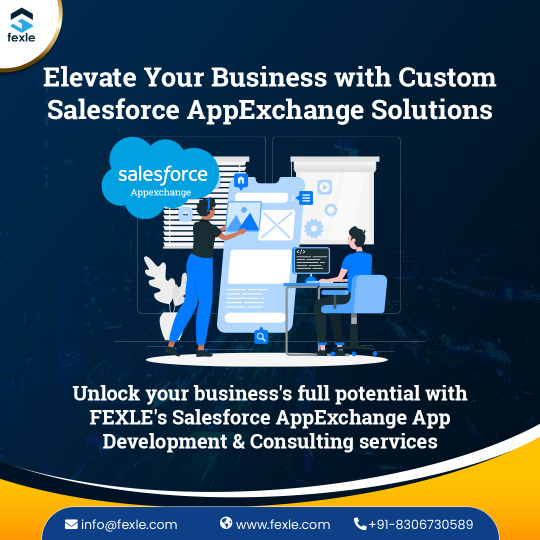#salesforce AppExchange app
Explore tagged Tumblr posts
Text
Discover top Salesforce apps for customer service teams to streamline case management, automate routine workflows, and provide personalized support at scale. These apps help boost agent productivity, improve response times, and ensure consistent, high-quality customer experiences—all while staying fully integrated within your Salesforce ecosystem. Elevate your service operations with tools built to drive customer satisfaction.
#Salesforce Apps#Salesforce Apps for Services#Salesforce AppExchange Apps#Salesforce AppExchange Application
1 note
·
View note
Text







If your Salesforce setup is solid but the ROI feels... underwhelming—AppExchange might be the multiplier you’re missing.
From 60% faster deployments to a 3.2x return on investment, the right apps don't just add features—they unlock growth.
Let’s make Salesforce work harder for your business: https://www.algoworks.com/salesforce/appexchange-development/
#salesforce ROI#Appexchange#salesforce apps#salesforce development services#bussiness growth#CRM tools#Salesforce experts#salesforce boost#tech in business#salesforce
1 note
·
View note
Text
How to Implement Salesforce AppExchange Development
In the ever-evolving landscape of business technology, Salesforce has emerged as a powerhouse, offering a robust platform for customer relationship management (CRM) and beyond. One of the key features that sets Salesforce apart is its AppExchange, an ecosystem that allows businesses to extend the capabilities of their Salesforce instance by integrating third-party applications. If you're ready to take your Salesforce experience to the next level, here's a comprehensive guide on how to implement Salesforce AppExchange development.
Understanding the AppExchange:
1. Explore the Marketplace:
Start by Browsing: Begin your journey by exploring the Salesforce AppExchange marketplace. Identify apps that align with your business needs and objectives.
Read Reviews: Pay attention to user reviews to gauge the performance, reliability, and user-friendliness of potential apps.
2. Define Your Requirements:
Identify Business Needs: Clearly define the specific functionalities or solutions your business requires. This will guide your search for the right applications on the AppExchange.
Getting Started with Development:
3. Leverage Salesforce DX:
Set Up Salesforce DX: Salesforce Developer Experience (DX) is a set of tools that streamlines the development process. Familiarize yourself with Salesforce DX and set up your development environment.
4. Choose a Development Path:
Native vs. Custom Development: Decide whether to build a native Salesforce app or opt for custom development using languages like Apex and Lightning components. Consider factors such as complexity, scalability, and maintenance.
5. Design a User-Centric Interface:
Prioritize User Experience: A well-designed user interface is crucial for user adoption. Ensure your app provides a seamless experience within the Salesforce environment.
Development Best Practices:
6. Embrace Apex Coding:
Master Apex Programming: Apex is Salesforce's proprietary programming language. Learn to leverage Apex for building robust business logic within your applications.
7. Harness the Power of Lightning Components:
Create Lightning Components: Utilize Lightning components to build modern, responsive, and dynamic user interfaces. Lightning components enhance the overall user experience.
8. Test Rigorously:
Implement Test Classes: Develop comprehensive test classes to ensure the reliability and functionality of your app. Automated testing tools can expedite the testing process.
Security and Compliance:
9. Prioritize Security Measures:
Follow Salesforce Security Guidelines: Adhere to Salesforce's security best practices to safeguard sensitive data. Implement features like two-factor authentication and encryption.
10. Ensure Compliance:
Understand Compliance Standards: Familiarize yourself with industry-specific compliance standards relevant to your business. Ensure your app aligns with these standards.
Deployment and Maintenance:
11. Plan Deployment Strategically:
Implement a Deployment Plan: Develop a deployment plan to minimize disruptions during the rollout of your Salesforce app. Consider deploying updates during non-business hours.
12. Monitor and Iterate:
Continuous Improvement: After deployment, actively monitor user feedback and app performance. Iterate on your app based on feedback and evolving business needs.
Conclusion:
Implementing Salesforce AppExchange development is a journey that requires a combination of strategic planning, technical expertise, and a commitment to user satisfaction. By following these steps and embracing best practices, you'll unlock the full potential of the Salesforce platform, elevating your business processes and providing a tailored experience for your users. The AppExchange is your gateway to a world of possibilities—seize the opportunity and propel your business forward.
#Salesforce Development#Salesforce App Development#Implement Salesforce AppExchange Development#Salesforce AppExchange Development#Salesforce Admin Configuration#AppExchange Analytics
0 notes
Text
AppExchange App Development and Consulting Services in Best Price

Whether you're looking to improve customer service, enhance sales efficiency, or streamline your operations, take your Salesforce experience to the next level with our custom AppExchange app development services. We understand your unique needs and create tailored apps that seamlessly integrate with your existing Salesforce ecosystem.
#salesforce#fexle#salesforce consulting services#crm consulting#salesforce gold partner#Salesforce AppExchange App Development Services
0 notes
Text
1 note
·
View note
Text
#salesforce appexchange development#appexchange app development#salesforce appexchange developer#appexchange development
0 notes
Text

Salesforce CRM Development Company – Expert Salesforce Development Services
Discover how HashStudioz, a leading Salesforce CRM Development Company, empowers businesses with tailored Salesforce solutions. From custom CRM development and third-party integrations to Lightning components and AppExchange apps, our expert team delivers scalable, secure, and intelligent Salesforce development services. Elevate your customer experience and business efficiency with HashStudioz – your trusted Salesforce partner.
1 note
·
View note
Text
Expert Salesforce Mobile App Development Services | Synexc
Unlock the full potential of your Salesforce platform with custom mobile app development services from Synexc. Our Salesforce-certified experts design and develop scalable, user-friendly mobile apps tailored to your business goals. Drive productivity, streamline workflows, and stay connected on the go with powerful Salesforce mobile solutions. Explore our end-to-end development services today!
URL: https://synexc.com/salesforce-app-development
0 notes
Text
The Rise of Salesforce AppExchange Development in the USA

Salesforce, the world’s best CRM platform, has transformed the way businesses manage customer relationships. But beyond its built-in capabilities lies a powerful ecosystem that’s fueling even greater innovation: Salesforce AppExchange.
Often called the “App Store for business,” AppExchange allows developers and companies to build, sell, and deploy custom applications that extend Salesforce's core functionality. And in recent years, there has been a notable surge in Salesforce AppExchange development across the USA—driven by demand for digital transformation, industry-specific solutions, and scalable business apps.
In this article, we explore the reasons behind this rise and how US-based companies are leveraging AppExchange to lead the next wave of CRM innovation.
What Is Salesforce AppExchange?
Launched in 2006, AppExchange is Salesforce’s official marketplace for business apps and consulting services. Companies can find and install apps that add functionality to their Salesforce instance—ranging from marketing automation tools to accounting connectors, analytics dashboards, AI assistants, and more.
For developers, AppExchange is a launchpad to build products that reach Salesforce’s massive global customer base. For businesses, it’s a hub of pre-built solutions that accelerate development, reduce costs, and drive efficiency.
Why AppExchange Development Is Booming in the USA
1. Growing Demand for Industry-Specific Solutions
US businesses operate in some of the most regulated and specialized markets—healthcare, finance, manufacturing, education, and government. Generic CRMs often fall short.
This has created a surge in demand for vertical-specific apps built on Salesforce. For example:
A HIPAA-compliant patient management app for healthcare providers
Loan processing and compliance tools for financial institutions
Public engagement platforms for local governments
US-based developers and Salesforce ISVs (Independent Software Vendors) are building these niche solutions and publishing them on AppExchange.
2. Shift Toward Composable Business Models
More US companies are adopting a modular, API-first approach to their digital ecosystems. Instead of investing in monolithic platforms, they’re choosing flexible apps that can be plugged into their CRM as needed.
AppExchange enables this by offering:
Modular solutions
Pre-verified security and compliance
Seamless integration with Salesforce data and workflows
This aligns perfectly with the agile and scalable approach modern US enterprises are striving for.
3. Salesforce’s Support for Developers and ISVs
Salesforce has made significant investments to support the AppExchange ecosystem, especially in the US:
Dedicated ISV Partner Programs
Trailhead training for app builders
AppExchange Security Review and Go-To-Market assistance
Visibility at events like Dreamforce and TrailblazerDX
This strong infrastructure makes the US a prime environment for AppExchange development to thrive.
4. Faster Time-to-Market and Lower Development Costs
Instead of building new solutions from scratch, US companies are turning to AppExchange apps to quickly deploy solutions for lead management, customer service, forecasting, and more.
For custom apps, US Salesforce developers are:
Building apps using Lightning Web Components (LWC)
Leveraging existing APIs and objects
Using DevOps tools for CI/CD in the Salesforce ecosystem
The result: faster innovation cycles and a higher return on investment.
5. Monetization Opportunities for US Startups and Product Teams
AppExchange has become an exciting new market for SaaS startups and digital product teams in the US. Instead of building a standalone SaaS tool and trying to acquire customers from scratch, they’re embedding directly within Salesforce—meeting customers where they already work.
This creates opportunities to:
Reach thousands of Salesforce customers
Monetize apps through flexible licensing models
Offer freemium versions and upsell premium features
The US startup ecosystem, combined with Salesforce’s global footprint, is creating new growth paths for product innovation.
Success Stories: US AppExchange Trailblazers
Several US-based companies have already made significant impacts with their AppExchange offerings, such as:
Conga – Contract lifecycle management tools
Docusign – E-signature and document workflows
nCino – A full digital banking platform built on Salesforce
TaskRay – Project management for Salesforce users
OwnBackup – Backup and recovery tailored for Salesforce data
These success stories show how AppExchange apps can scale rapidly, serve niche markets, and create recurring revenue streams.
The Future of AppExchange in the USA
As Salesforce continues to push into new areas—AI with Einstein, industry-specific clouds, and hyperautomation—AppExchange development will only become more important. US developers and companies are at the forefront of this evolution, driven by:
A strong innovation culture
Access to top development talent
A large and digitally mature customer base
Whether it’s custom solutions for internal use or commercial products for global distribution, AppExchange offers a strategic platform for US companies to innovate, scale, and lead.
Final Thoughts
The rise of Salesforce development services in the USA reflects a broader shift in how businesses build and consume technology: faster, more modular, and deeply integrated with platforms like Salesforce.
If you're a business looking to streamline operations or a product team aiming to break into the Salesforce ecosystem, now is the perfect time to explore the AppExchange opportunity. With the right development partner, the path from idea to impact is shorter than ever.
0 notes
Text
Salesforce Integration Partners: How to Choose the Best One for Your Business
Salesforce is a powerhouse for businesses. But to make the most of it, you need the right Salesforce integration partners. The wrong choice can lead to wasted time, money, and frustration. So, how do you find the best fit? Let’s break it down.
Understand Your Needs
Before you search for Salesforce integration partners, define your goals. Do you need CRM customization, third-party app integration, or data migration? Different partners specialize in different areas. For example, if you need e-commerce integration, look for a partner with experience in platforms like Shopify or Magento.
Look at Experience and Expertise
Not all Salesforce integration partners are equal. Some have deep experience in specific industries. Others focus on technical solutions. Check their past projects. If you run a healthcare business, a partner who has worked with HIPAA-compliant integrations will be a better fit than one who specializes in retail.
Check Certifications and Partnerships
Salesforce has a partner program with different levels—Registered, Silver, Gold, and Platinum. Higher-tier partners have proven expertise. Certifications also matter. Look for Salesforce integration consultants with certified developers and architects on their team.
Evaluate Customer Reviews and Testimonials
Reputation speaks volumes. Read client testimonials. Check reviews on platforms like G2, Clutch, or Salesforce AppExchange. If multiple businesses praise a partner’s communication skills and problem-solving ability, that’s a good sign. If you find complaints about missed deadlines, reconsider.
Assess Their Support and Maintenance Services
Integration isn’t just about setup. You’ll need ongoing support. Ask potential partners about post-integration services. Do they offer 24/7 support? Do they provide updates as Salesforce evolves? A good partner will ensure your systems keep running smoothly.
Compare Pricing Models
Budget matters. But don’t just go for the cheapest option. Some partners charge fixed rates, while others work on a time-and-materials basis. A lower price might mean hidden costs down the line. Make sure you understand what’s included in the contract.
Demand a Clear Roadmap
A solid Salesforce integration consultant will outline a clear implementation plan. They should provide a timeline, key milestones, and expected challenges. If a partner is vague about deliverables, that’s a red flag.
Consider Communication and Collaboration
Smooth integration depends on teamwork. Your partner should work well with your internal teams. Look for clear communicators. Regular updates and transparent reporting will make the process smoother.
Request a Demo or Proof of Concept
Seeing is believing. Ask for a small test project or a demo. This will help you assess their approach before making a long-term commitment. If they hesitate, they might not be the right choice.
Final Thoughts
Choosing the right Salesforce integration partner isn’t just about technical skills. Experience, communication, and long-term support matter too. Take your time, do your research, and pick a partner who aligns with your business needs.
With the right choice, your Salesforce integration will be smooth, efficient, and future-proof!
0 notes
Text







Choosing the right AppExchange app doesn't have to be overwhelming. With 7,000+ options, strategy matters. Swipe through our expert guide to filter faster, test smarter, and pick confidently.
Need something tailor-made? Partner with certified Salesforce pros.
#salesforce appexchange#salesforce#appexchange#crm#cloud computing#business solutions#tech tips#digital transformation#salesforce partners#app selection
1 note
·
View note
Text
Understanding the Salesforce AppExchange

Dive into the Salesforce AppExchange — the world’s leading enterprise cloud marketplace — to discover how prebuilt apps, components, and consulting services can supercharge your Salesforce org. Learn how to find, install, and customize solutions that solve real business challenges and extend CRM functionality in minutes.
#SalesforceAppExchange#Salesforce#CRMApps#CloudMarketplace#AppExchangeSolutions#SalesforceConsulting#AppExchangeApps#SalesforceEcosystem#ExtendSalesforce#NoCode#LowCode#SalesforceAdmin
0 notes
Text
Understanding the Salesforce AppExchange

Dive into the Salesforce AppExchange — the world’s leading enterprise cloud marketplace — to discover how prebuilt apps, components, and consulting services can supercharge your Salesforce org. Learn how to find, install, and customize solutions that solve real business challenges and extend CRM functionality in minutes.
#SalesforceAppExchange#Salesforce#CRMApps#CloudMarketplace#AppExchangeSolutions#SalesforceConsulting#AppExchangeApps#SalesforceEcosystem#ExtendSalesforce#NoCode#LowCode#SalesforceAdmin
0 notes
Text
#5-star File Management App for Salesforce#Best File Management App on AppExchange#Salesforce file management#XfilesPro File Management App
0 notes
Text
Understanding the Salesforce AppExchange

Dive into the Salesforce AppExchange — the world’s leading enterprise cloud marketplace — to discover how prebuilt apps, components, and consulting services can supercharge your Salesforce org. Learn how to find, install, and customize solutions that solve real business challenges and extend CRM functionality in minutes.
#SalesforceAppExchange#Salesforce#CRMApps#CloudMarketplace#AppExchangeSolutions#SalesforceConsulting#AppExchangeApps#SalesforceEcosystem#ExtendSalesforce#NoCode#LowCode#SalesforceAdmin
0 notes